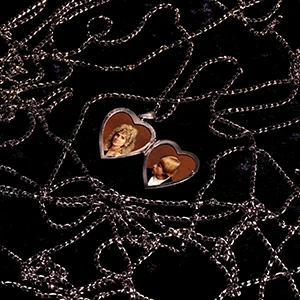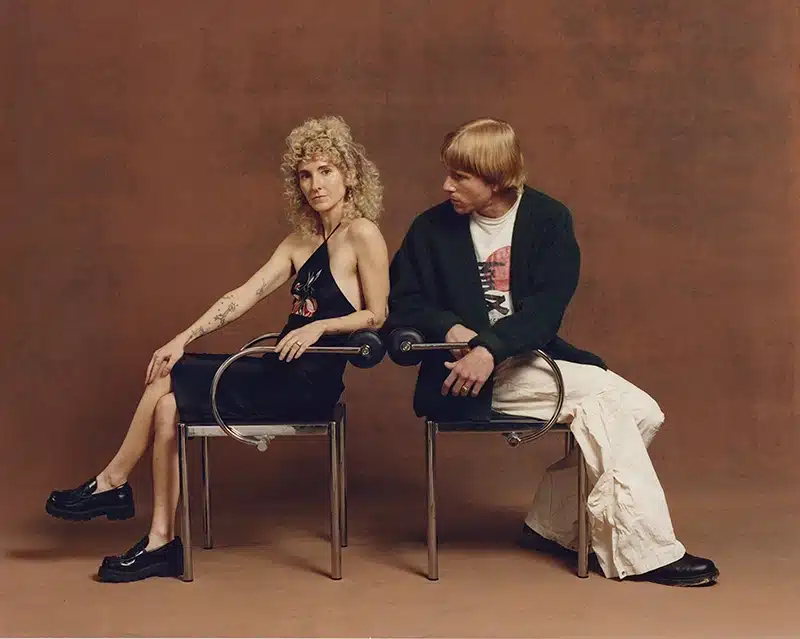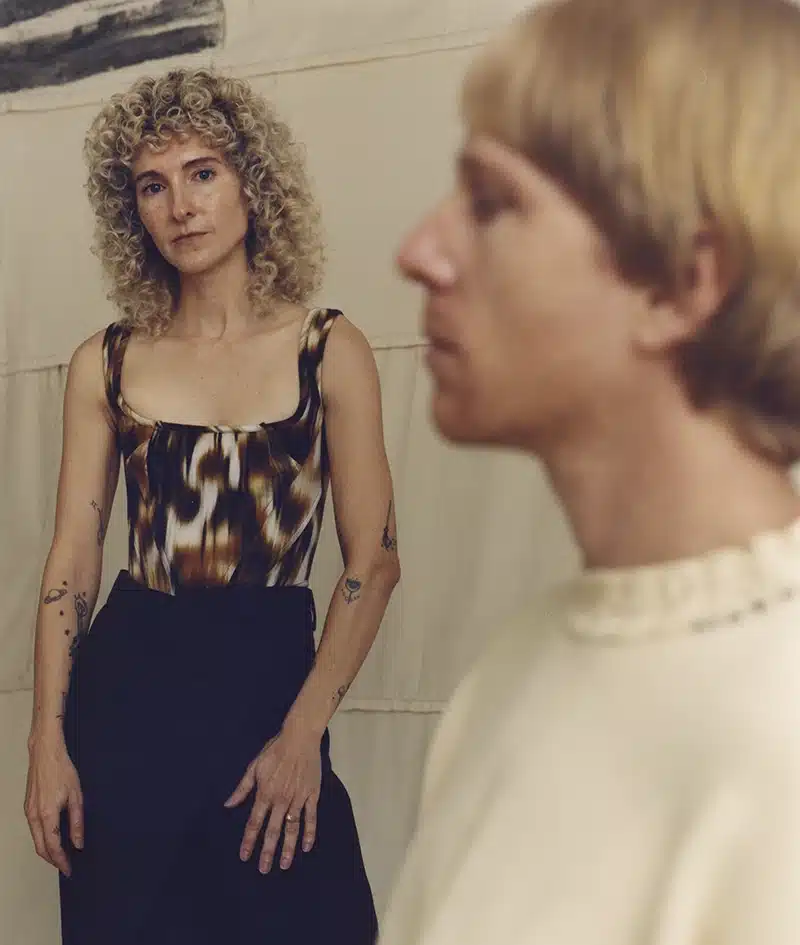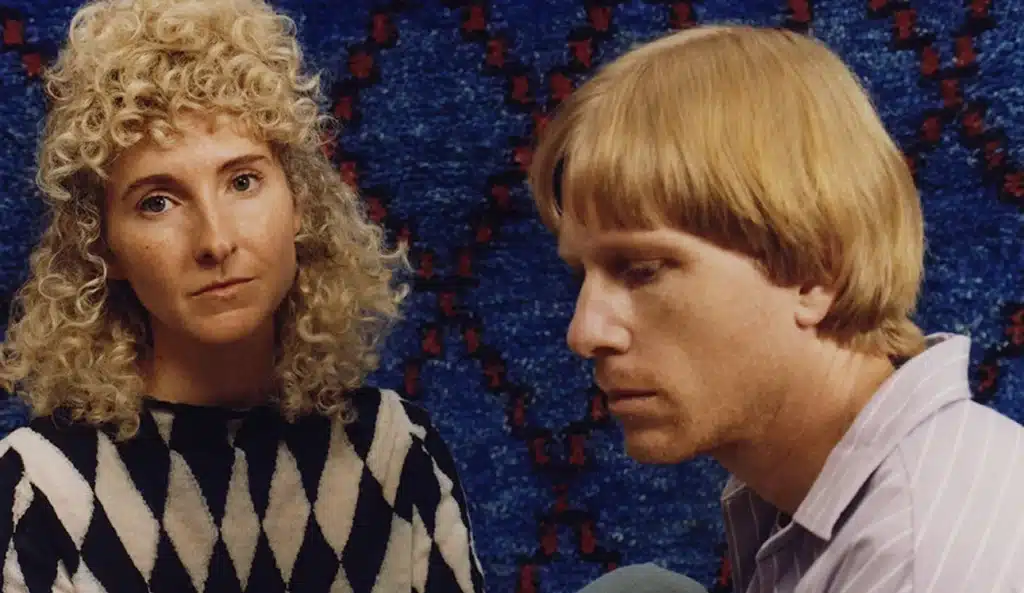
It’s game-set-match for the husband-and-wife Tennis team. This isn’t a temporary hiatus. It’s a full-fledged farewell with a “0%” chance of changing their minds.
 Face Down in the Garden Tennis Mutually Detrimental 25 April 2025
Face Down in the Garden Tennis Mutually Detrimental 25 April 2025
Bands come and go, and sometimes come back (again and again, especially when the well runs dry). But the Denver indie pop-rock duo named Tennis, formed in 2010 by college philosophy students Alaina Moore and Patrick Riley, aren’t playing around regarding their music career.
Calling their downtown Denver apartment “home” for over a decade while spending a lot of time in Los Angeles, it’s game-set-match for this husband-and-wife singer-songwriter Tennis team. This isn’t a temporary hiatus. It’s a full-fledged farewell with a “zero percent” chance of changing their minds.

On a phone interview four days after releasing Face Down in the Garden (on their own Mutually Detrimental label), Moore went above and beyond her public-relations duties as Tennis’ doubles partner. (Riley, a guitarist who writes music that wraps nicely around Moore’s soothing lyrics and sweet vocals, is the tour manager and van driver while they divide interview and production tasks ahead of another long road trip.)
At great length, Moore openly discussed the circumstances surrounding what she called in a recent release “our last studio album, at least in this configuration”, while announcing their intentions. “In full-in rehearsal mode right now,” they’re preparing for a headlining Face Down in the Garden tour to support the 25 April release of their seventh full-length album, which they produced and recorded in their home studio.
Appearances begin in Las Vegas on 16 May, when they will also release Neutral Poetry: First Recordings, an eight-song EP of previously unheard demos from 2009-10. Tennis resume the weekend with shows on successive days at Salt Lake City’s Kilby Block Party, including a 17 May After Party at Metro Music Hall, and an 18 May set from 4:50-5:40 on the Kilby Stage. Since this is a festival limited to shorter stints on stage, Moore lets an upcoming Kilby audience know what to expect: “I think they’re gonna get a really concise set with hopefully all the hits. Try to give the crowd what they want.” (laughs)
Tennis’ last scheduled stop is the recently announced show at London’s O2 Forum Kentish Town on 23 October. Their touring band includes longtime drummer Steve Voss (“He’s a legend,” Moore says) and new bass player Kellen Harrison, an “old friend” of theirs who previously played with Wild Belle.
“Touring has always been kind of tough on me, which is one of many, many reasons why I feel ready to phase out of this stage of life,” Moore maintains when asked how she’ll feel emotionally reaching the end of the road. “… I’m ready to have a more domestic, grounded experience of not just picking up and going constantly. … I think it will be hard, but knowing that it’s the last time we’re doing this will make it poignant.”
Basking in the glow of what she called an “overwhelmingly positive” response to the new album from “an outpouring of people just saying that they really appreciated our music throughout their lives,” Moore adds, “It’s been really sweet and it means a lot to us. On a personal note, we just feel really proud of what we’ve done, and, at the same time, very ready to move on to something new.”
Only time will tell what that eventually means, but Moore reveals during our interview for PopMatters that she’s ready to leave her song lyrics behind and is “working on a book” that will be a memoir. “I really want to write long form,” she explains, while hoping to take on fiction and nonfiction. “I have felt stifled by the parameters of lyrics. I’ve said everything I can say I feel like in a song. I need a lot more real estate to express what I’d like to say.”
Expect many points to be made by Moore in a love-love story as Tennis head toward their end game. This one needs a beginning, though.

First Serve
While growing up in the Denver supersized suburb of Aurora, a homeschooled Moore also went the last couple of years to a high school that was “so small, it wasn’t credited.“ It no longer exists. She grew up intending to be a singer and became a vocal performance major in college. That experience almost derailed her music career before it even started.
“I quickly learned that I hated studying music formally,” she declares. “I hated being graded on my musicality. I hated getting grades on singing. It just felt like I never fit in. Weirdly, I didn’t even make it onto the mixed gender choir, which was the best choir. I auditioned, and they wouldn’t let me on. (laughs) So I was always the one cut from the team.
“I gave up music completely and switched to studying philosophy, and that’s where I met Patrick (in a class at the University of Colorado Denver). We met as philosophy majors and kind of bonded over other things. And didn’t really bring up our past with music. He had also studied music before he met me.”
After graduation, Moore applied to law school with the intention of becoming a lawyer. A series of rejection letters, one right after the other, meant another career ambition was greeted like an overhead smash. That same week, though, law didn’t win out. Moore and Riley, who were married in 2009, got a record deal. Fat Possum released their first two studio albums, 2011’s Cape Dory and 2012’s Young & Old, the latter produced by Black Keys drummer Patrick Carney.
“It just definitely was a big left turn that came from the universe,” said Moore, a classically trained pianist.
Second Serve
Leaving Arizona and moving to what he once called an “insanely white part of Colorado with no ethnicity — the whitest high school that you could possibly think of,” Riley had other aspirations as well. According to Moore, she made fun of him after discovering that he played tennis, a sport considered “not cool” where she grew up. “Kind of bougie and lame.”
Then, “a bit later into our relationship,” she discovered he was “actually, like, the hardest-working junior player. He was number two in the state. He was slated to get all of these scholarships. He had one final regional tournament to win, and then he could’ve gone to any school he wanted on a tennis scholarship.”
When he lost the big match, Riley also lost the scholarship. “He just watched his life dream just evaporate in front of him,” Moore continues. “It actually kind of gave him a bit of a mental breakdown when he was 18. It was really tough on him, and I didn’t know any of that.
“I was so blown away. I felt really bad for having mocked him for playing tennis. I had never taken anything so seriously in my life at that point.” When they started playing music together, Moore named the band Tennis, calling that decision “a bit tongue-in-cheek” and “a bit sentimental.” Knowing what he almost accomplished, “I named it kind of to honor his first endeavor. I was like, ‘This will be your new tennis. This thing that you pour yourself into.’”
They didn’t envision their band lasting very long anyway. Moore laughs at the thought now, saying, “Not even six months. I don’t even know if we would’ve named the band Tennis if it would actually become our creative project permanently. I think we may have kept the Tennis inside joke just to us and thought of something that would be more successful in a Google search.” (laughs)
When a trivial pursuit “just kind of grew legs and took off on its own,” Moore and Riley were gobsmacked, even if the first sold-out shows they played were in small but cool clubs like Denver’s Larimer Lounge and New York City’s Cake Shop in the Lower East Side.
“We were just in awe. We can’t even believe these people are here. … It was absolutely mind-blowing,” she fondly recalls, still not sure at the time what fate was awaiting them.

Drop Shots
“Over the years, our sound has evolved into three distinct categories: Brill Building, synth-pop, and rock,” Moore offers in the press release that announced Face Down in the Garden’s arrival. Inspired by sailing, which got them out of landlocked Denver for trips like an eight-month voyage along the Eastern Seaboard after their college graduation, they appeared on late night TV shows hosted by Jay Leno, David Letterman and Conan O’Brien, played high-profile festivals like Coachella and literally reached new heights with a headlining show at the magnificent outdoors landmark west of Denver known as Red Rocks.
While curbing her enthusiasm for that stop on 3 June 2021 (Molly Burch was the opening act) by sharing matter-of-factly, “It was during COVID, so it was a limited capacity,” she concludes, “but it was still the biggest show we’ve ever had in Denver. It was really amazing. …
“That was another reason why we felt like we’ve taken Tennis as far as we can go. We have no goals left. (laughs) After this tour, we’ll have played every venue we’ve wanted to play (including returning to the Greek Theatre in Los Angeles, which was always “a huge bucket-list achievement” for them). All the little career highlights. … We just feel very fulfilled.”
Of course, so many thrilling moments on tour can come at a cost. Moore describes themselves as “super-frugal” and “very DIY” and laughs while calling her man behind the wheel of a van with a trailer “a control freak.” Yet she takes great pride in believing, “We’ve made it work being like a mid-tier indie band. We’ve made that work financially during a time when income streams keep being cut in half or removed entirely. And we’ve made it work by having this just extremely hands-on, DIY ethos where we’re not divas.
“We don’t need a bus, we don’t need to be handled, we just show up, we drive ourselves, we load in ourselves, we do it ourselves. That’s what helped us make it this long. And that’s also part of why we’re really burned out.” (laughs)
Friction within a band seems like a prerequisite for any songwriting twosome that signs up, whether to become a dynamic duo or to help form a Fab Four. Some rare pairs I enjoyed interviewing make it work (Over the Rhine’s Linford Detweiler/Karin Bergquist, the Mastersons’ Chris Masterson/Eleanor Whitmore, Shovels and Rope’s Michael Trent/Cary Ann Hearst, Ida Mae’s Chris Turpin/Stephanie Jean Waard) while others don’t (the Civil Wars’ John Paul White/Joy Williams, who weren’t linked romantically, probably for good reason; HoneyHoney’s Ben Jaffe/Suzanne Santo, terrific performers who deserved to go far but apparently couldn’t keep it together). A number of them have admitted that a 24/7 existence can be challenging.
“It’s nice to hear that that’s the perspective of other couples,” Moore acknowledges. “It is 24/7. Our work is our life, and our work is even our marriage. That’s something we’ve discussed, too, about our whole marriage has been in this context.
“Even though it’s been a most amazing, profound experience that we’re so thankful for, we do want to see what our marriage is like outside of the context of the band. And I don’t even know what that means. As long as the band is going, it’s the most important thing.”
Putting a like-minded support group of musical couples in the same room to share such feelings seems like a logical thing to do, but Moore hardly thinks it’s possible or worthwhile for them to even try.
“We’ve met some amazing people through this experience,” she confides. “Great friends and some have been mentors in ways to us. But honestly, we really haven’t found anyone that we can come to about this for guidance, advice, or perspective. Honestly, we have really felt like this industry is kind of like a bunch of lone wolves, and it’s very isolating. I don’t feel like there’s a very strong community. … I’ve never felt plugged into a strong community.”
Moore reasons that working with a “selective team of people,” whether it’s in the studio or on tour, creates this sense of isolation. “Sometimes you just do a ton of dates and we don’t even talk,” she adds. “You’re just getting through it, you know.”
Double Fault
Such pent-up feelings can take an emotional toll on artists, whether or not they’re succeeding. While occasionally leaning on family and friends for advice, Moore contends, “We don’t know anyone really who works full-time with their partner like we do. … So I do often feel like Patrick and I are kind of building something that we don’t have a model for.”
Maybe it’s too late for Tennis to build one, but Moore finds it funny when asked if they’ve ever broken up professionally. “Patrick has quit the band like three times,” she states with a laugh. “But then he rejoins the band on his own like two months later. So I always just say, ‘OK, you can quit the band. Let me know when you’re back in the band again.’”
Years of stress can damage the strongest of band connections, particularly on the endless road of tours and music-making. Moore points out those decisions by her professional and life partner were “usually over writing a record where it’s just so, so draining, that by the time we’re done, he’s like, ‘I quit. I’m done.’” (laughs) “And then we go on tour and we forget how hard it was to make the record and then we want to do it again.” (laughs)
Their experience making the latest LP had nothing to do with this early retirement, Moore insists. “We knew while we making this album that it would be our last one,” she divulges, while pointing out in the press release a series of “bizarre setbacks” (chronic illness, tire blowouts, engine troubles, “a doomed voyage” at sea that ended with an attempted robbery) made 2024 a harrowing year.
At least today Moore can find humor in the tire incident. It led to a new song (“12 Blown Tires”) and a new Sprinter van, realizing with a laugh that the previous vehicle “proved itself unreliable.” Yet beset by “weird obstacles in our paths that continually pulled us out of the studio,” Moore couldn’t help but think it “felt like the world was calling us out of the studio and out into the world.”
Trying to top themselves in the studio was another factor. “Every album that we would write, we would set new goals for ourselves creatively and raise the bar, just kind of ratchet up the stakes for ourselves creatively,” Moore asserts. “We’ve had a lot of conversations about what it means to, like, pursue your best and push yourself.
“Realizing, like, ‘I don’t want to be on this self-optimization treadmill where I’m squeezing myself for creative output, raising the bar indefinitely until we’ve like over-leveraged ourselves and we’re in like psychological torture.’ (laughs) We’ve felt like this, every album since (2017’s) Yours Conditionally has gotten significantly harder to write. I think they’ve also all improved. … We just didn’t really want to hit that downward slope. And we haven’t. We just didn’t want to let that happen.”
Playing to Win
Staying true to themselves, they didn’t second-guess the decision to call it a career. “I just think it was so clear to both of us. It was many things. It’s the stage of life we’re in. Like I’m ready to try and have kids. There’s just so many other things that have …” pausing briefly, then recalling “… it’s not the same as it was when Pat quit the band after Ritual in Repeat in 2013. That was because he’d wanted to quit the band before because we felt like we literally couldn’t go on another day.”
So Moore feels rejuvenated to embark on this farewell tour, knowing “we’re quitting on our own terms because it feels right.”
The fact that bands like Rilo Kiley, touring together for the first time in 17 years, and the Pains of Being Pure at Heart, back after breaking up in 2019, are on the road again (and in Kilby Block Party’s lineup) adds to her optimism.
“I think it’s nice to come back, you know, a significant amount of time later when it’s different,” Moore professes, not viewing reunion tours 10 or 15 years after a breakup strictly as sheer money grabs by a desperate artist. “I think that’s always on the table for us. But I can’t even wrap my head around that right now.”
Even if this tour runs smoothly as Tennis get their groove back, creating more memories filled with cool, cheering crowds instead of flat tires and hot tempers, how possible is it that they’ll reconsider their retirement? “Zero percent,” Moore proclaims, unwilling to give anyone a tiny sliver of hope. “I know exactly how it feels to be onstage. … It’s so special and I’m so grateful. And I’m also so ready for the next chapter of life.”
So with that mission statement delivered, get ready for Tennis’ fond—but—final farewell.
Growing up, Moore did rely on some invaluable words of wisdom from a man still close to her heart — her father. He often repeated a two-word life lesson that applied to anything his daughter pursued, whether she was quitting a day job or graduating from college: “Finishing well.”
To her, that meant, “Doing your very best right up until the very end, whatever that means for you,” Moore surmises. “So I have had that thought in my mind as we come to this conclusion with Tennis of ‘finishing well.’ I want to be present, I want to make it meaningful, I want to make it meaningful for the fans and for Patrick and myself and our band and crew who’ve been touring with us for a long time. I just want to really end on a really positive note.”
So the ball is in Tennis’ court now as Moore and Riley approach the finish line. When they take their best shot one last time, expect it to be a winner.


